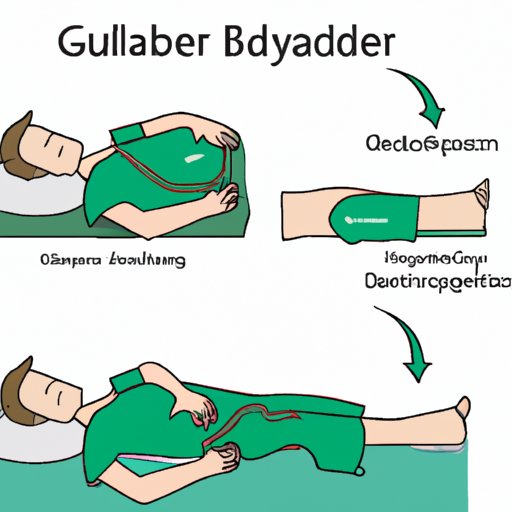
I. Introduction
After undergoing gallbladder surgery, getting enough restful sleep is crucial for a successful recovery. However, post-operative pain and discomfort can make it challenging to sleep comfortably. This article will provide tips and tricks for sleeping after gallbladder surgery, including advice on making the sleep environment conducive to rest, managing pain and discomfort, choosing comfortable sleeping positions, coping with insomnia, and finding comfort and relaxation at bedtime.
II. Importance of Resting After Gallbladder Surgery
Getting enough restful sleep is crucial for the recovery process after gallbladder surgery. Sleep is the body’s natural way of healing itself, and it can promote feelings of well-being and reduce stress. To create a sleep-conducive environment, consider reducing noise and light in the bedroom. Try using earplugs, an eye mask, or white noise machines to block out distractions and create a peaceful sleeping environment.
III. What to Expect When Sleeping After Gallbladder Surgery
It is normal to experience pain and discomfort after gallbladder surgery, which can make sleeping difficult. To manage discomfort, take pain medication according to your doctor’s instructions. Avoid lying flat on your back, as this can put pressure on the incision site and cause pain. Instead, try sleeping on your side with a pillow between your legs or behind your back to support your body.
IV. Sleeping Positions and Pillows for Support
Choosing the right sleeping position can make a big difference in promoting comfort and rest. The best sleeping position after gallbladder surgery is usually on your side with your knees bent, as this helps take pressure off your incision site. Use pillows to support your head, neck, and back, and to cushion any areas of discomfort. A pregnancy pillow, body pillow, or wedge pillow can be useful for supporting your body in bed and reducing discomfort.
V. Coping with Insomnia After Gallbladder Surgery
Insomnia can be a common issue during the recovery process, and it can be caused by a variety of factors such as pain, discomfort, and stress. To address insomnia, try practicing relaxation techniques such as deep breathing exercises, meditation, or visualization. Stick to a regular sleep schedule, even if you have trouble sleeping, and avoid napping during the day. If insomnia becomes persistent, talk to your doctor about medication or other treatments that may be helpful.
VI. Finding Comfort in Sleep After Gallbladder Surgery
In addition to physical discomfort, emotional challenges such as anxiety and stress can also impact sleep. To find comfort and relaxation at bedtime, try engaging in a soothing bedtime routine such as taking a warm bath, drinking tea, or reading a book. Try to avoid using electronics before bedtime, as the blue light can interfere with sleep. If you find yourself becoming anxious or stressed at bedtime, try a calming distraction such as listening to music or practicing mindfulness.
VII. Conclusion
Sleep is important for the body’s natural healing process after gallbladder surgery, but it can be challenging due to post-operative pain and discomfort. By creating a sleep-conducive environment, managing discomfort with pain medication, choosing comfortable sleeping positions, coping with insomnia, and finding comfort and relaxation at bedtime, you can prioritize rest and find ways to make sleep after surgery more comfortable.





